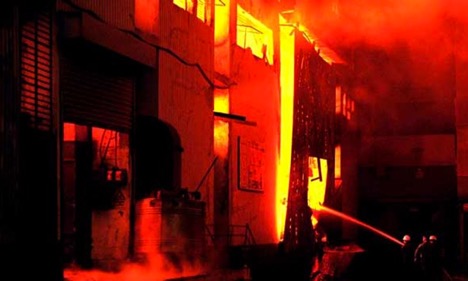Collateral Damage for Global Capitalist Production: An Industrial Disaster in Karachi
Firefighters trying to control a blaze at a garment factory in Karachi, Pakistan, which killed 314, and injured more than 600 people. PHOTO: AFP
Ambulances and fire brigade vehicles outside a building, after a fire at a garment factory in Karachi September 12, 2012 (a day following the eruption). PHOTO: REUTERS/Akhtar Soomro
On September 11, 2012 a fire broke out in a garment factory, located in Baldia Town, Karachi, Pakistan (on the same day, incidentally, another fire broke out in a shoe making factory in Lahore, another urban center in Pakistan).
Baldia Town is located inside the Sindh Industrial Trading Estate (SITE) in the Karachi metropolitan area. Reportedly, 314 people died in the garment factory fire, which was said to have erupted due to a short circuit, and over 600 were seriously injured, while 100 were rescued. The factory belonged to Ali Enterprises, owned by two Pakistani industrialists. The company is a member of the Pakistan Hosiery Association and an active sales and income tax filer. According to news reports, there were about 1,500 workers present in the four-story, 2,000-square-yard factory when the fire broke at around 6:00 pm. At the scene of the tragedy, it was reported that the fire department arrived 90 minutes after the fire erupted. The Fire Department’s spokesperson said that there was so much heat coming from the building that fire fighters could not enter it and were trying to put out the fire from the outside, suggesting that the effort would need to be complemented aerially, requesting assistance from the Pakistan Air Force. An opinion piece remarked: “Even if it had [arrived on time], the fire brigades were hardly capable of doing their job effectively. With no ladders, hammers or even the proper attire, they watched helplessly as the fire continued to ravage the building and the people inside. With the little equipment they did have, they managed to break down one wall and get some of the workers out. By this time, volunteers from the colony behind the SITE area had come to help, risking their own lives – many suffered burns and ended up at the hospital as well.”
When the fire finally died down after 12 hours, the extent of the damage came into full view: the loss of life had been this significant due to the exit doors being locked from the outside, which trapped workers inside the blazing structure. Locking doors is a common practice in production industries in Pakistan to discipline labor. The practice allows factory owners to make sure workers don’t take any unauthorized breaks.
A sign board at the factory explaining the evacuation plan in case of emergency. PHOTO: AYESHA MIR/ THE EXPRESS TRIBUNE
A woman holds a portrait of her son while waiting with others to identify his body. PHOTO: REUTERS “If my son does not return, I will commit suicide in front of the factory,” one woman shouted before news cameras as relatives tried to console her [SOURCE: NY Times]
There were further reports that there was only one exit in the building, which also made the rescue mission difficult. In an attempt to save their lives, some trapped workers broke doors and windows (which were grilled and locked as well). According to a news article: “In desperation, some flung themselves from the top floors of the four-story building, sustaining serious injuries or worse. But many others failed to make it that far, trapped by an inferno that advanced mercilessly through a building that officials later described as a death trap.” It has been termed as the worst industrial disaster in Pakistan’s history.
Firefighters battling the fire following day. PHOTO: AFP
Note the lack of firefighting gear of the Fire Brigade staff.
The factory was producing garments for the international garment industry on contractual assignments, producing apparel for foreign brands based in Europe and the US. Much of the denim was produced for German textile discounter KiK, which claims to control enforcement of labor laws and security standards for its suppliers. ‘KiK’ stands in German for 'The Customer Is King'. According to the Clean Clothes Campaign, the firm is Germany’s seventh-largest textile retailer and was set up in 1994 by German entrepreneur Stefan Heinig, establishing a discounter model of low-cost retailing for clothing. It operates over 3,200 stores in eight European countries.
Men, women and children – most of them migrant workers from outside Karachi – worked at the factory in Karachi. The city is home to many other factories inside several industrial zones around the metropolitan area – a contending site in the geography of Fröbel et al (1978)’s “new international division of labor.” It is a metropolis competing with others like it in the global South, in global capital’s race to the bottom. According to the Pakistani Textile Workers Union, a high working pressure and overtime with unpaid additional work were frequent at the factory, which was also suspected of using child labor and locked workplaces analogous to prison cells. The owner of the factory had reportedly prevented inspections of the factory, and a few weeks prior to the fire, it had passed an internationally recognized safety test.
The point here is not to spotlight any evilness of an individual person or firm, but the economic mandates of global production and competition under capitalism. Pakistan has one of the largest labor resources in the world, being the 10th largest country in terms of available human workforce, offering the “continuous flow of penniless job seekers” that Fröbel et al (1978: 845) point to as one of the features of the new geographies of capitalist production.
The conditions under which Pakistan’s blue-collar labor works have often been raised by trade unions and workers’ rights organizations. Industrialists in Pakistan, eager to bring in business for their firms and to beat competition from other countries as well as other local garment producers are likely to offer very low rates for garment production to their foreign clients, which have the effect of very low pay for garment work coupled with long and demanding hours on the job and unsafe and onerous working conditions. Global demand directly affects the volume of orders and urgency with which these are required – both of which put a toll on workers, who are relatively fixed over short periods of time, so the entirety of orders have to be completed often by working even longer hours than usual. If standards of living were higher in Pakistan, it would not be one of the ‘winners’ in the race to the bottom, and it not would be a destination for garment retailers to dump their production process at. If people were better off than they are right now, they wouldn’t be desperate to earn the little money under exploitative conditions that they are currently agreeing to by doing garment work at the going rates.
The incident was highly publicized in the local media and by civil society bodies. The Chief Justice of the Sindh (provincial) High Court took suo moto* notice of the incident. The provincial Minister for Industry and Commerce announced his resignation. The Commissioner of Karachi ordered the police to lodge a first information report against the factory owner, and their names were placed on the Exit Control List so they wouldn’t be able to flee the country until proceedings were completed. The government and top politicians took notice of the incident and responded by announcing monetary relief packages for affected families of workers who perished and those who were injured. However, a news report from one year after the incident stated that none of the bereaved had received any payments to date due to bureaucratic hurdles. The judicial tribunal probing the incident was highly critical of the factory owners and government, which failed to enforce the law. It also criticized the police’s forensic department for failing to conduct a scientific investigation. Since the fire, which raged for so long that half the building collapsed, the factory has effectively shut down. The owners, however, were granted bail for a paltry sum, even though they were charged with premeditated murder of the victims.
While local authorities took action, the factory fire was singled out as a particularly unfortunate case, and in my view, not enough pressure was placed on policymakers to take preemptive steps to ensure avoidance of such disasters in the future. Interestingly, no one addressed the low wages and exploitative conditions of garment work – the only focus was on completing safety checks according to regulation. Even on this front, no policy steps were announced to allow for strengthening of compliance to occupational safety and health regulations for factory workers. The incident also failed to generate a movement within the working class and their supporters demanding better working conditions at garment factories.
For the sake of economic growth, policy makers in Pakistan, as in much of the global South, are willing to overlook the dire circumstances that people live and work through every day. In a populous country such as Pakistan, life is cheap, and is disposable for profit.
* A Latin term, literally meaning "on its own motion". Pakistan's constitution affords a provision whereby superior courts can hear cases of their own initiative, without a party bringing a petition to court.
Zahra Khalid is a graduate student in city planning at UC Berkeley. Her research interests include peripheral urbanization and securitization in War on Terror geographies.





